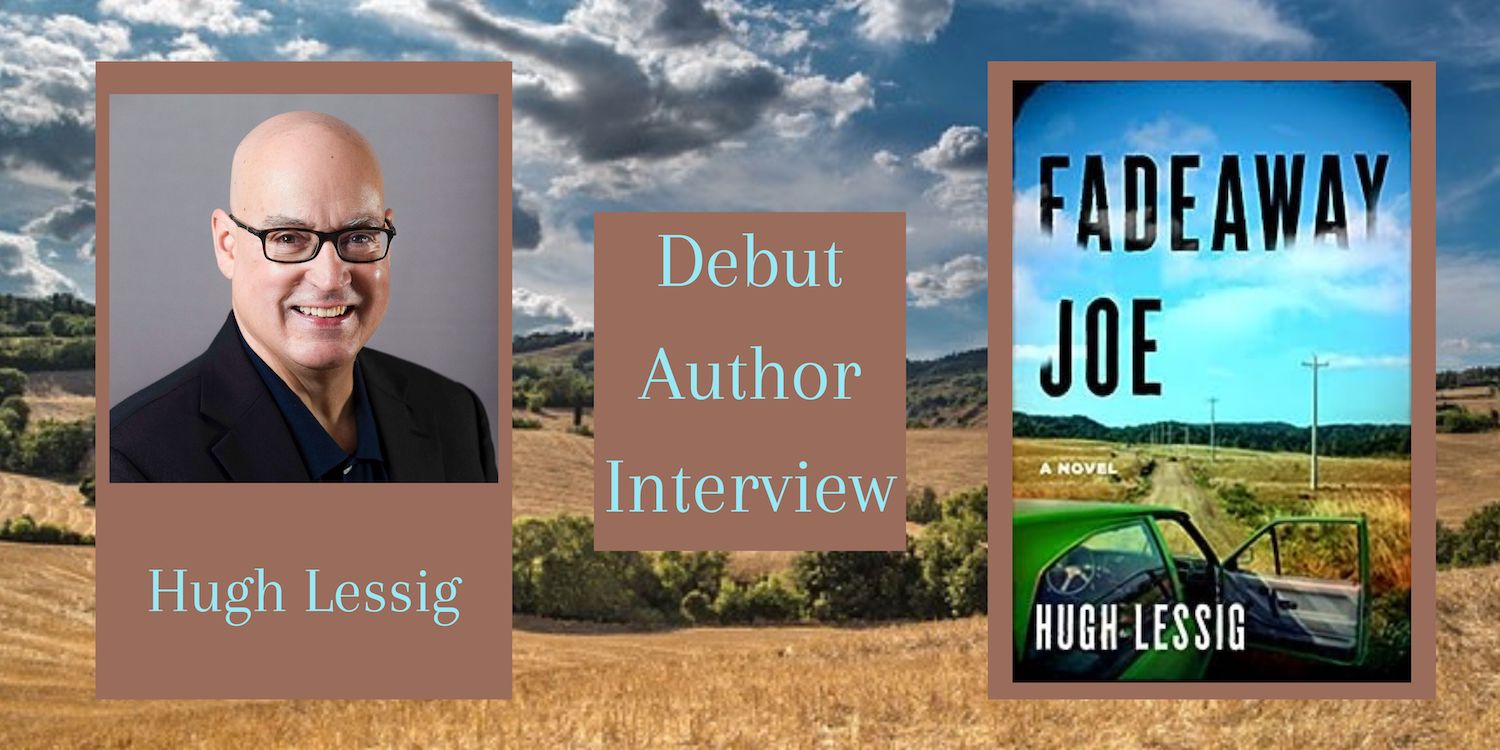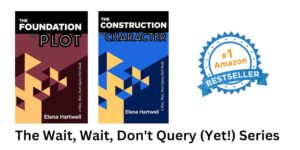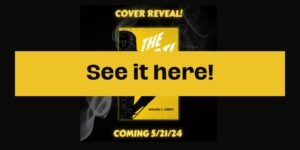Fadeaway Joe, the debut thriller from Hugh Lessig
Author Interview + Book & Author Info + Author Pet Corner!
Don’t miss any author interviews. Click the link here.
Fadeaway Joe
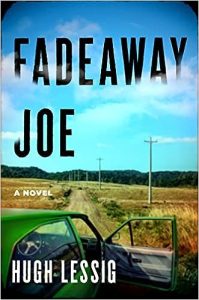 Perfect for fans of S. A. Cosby and Allen Eskens, Joe Pendergast must go all in one last time as he grapples with the ghosts of his past–and present–in this gritty, high-stakes thriller.
Perfect for fans of S. A. Cosby and Allen Eskens, Joe Pendergast must go all in one last time as he grapples with the ghosts of his past–and present–in this gritty, high-stakes thriller.
Sixty-four-year-old Joe has known violence his entire life. For forty years, he’s worked as an enforcer for loan shark and close friend Maxie Smith, breaking more than a few bones along the way. When Maxie abruptly fires him, Joe isn’t sure where to lay the blame—on Maxie, the man he once considered his brother, or on the early-onset Alzheimer’s that made Maxie lose faith in him in the first place.
To keep his head above water, he begins to operate a food truck that’s barely getting by. Desperate to regain some purpose in his life, Joe makes a life-altering decision: he’s going to take down Maxie Smith by any means necessary, once and for all. However, his plan of revenge is sidelined when he meets twenty-two-year-old Paula Jessup, a wise-cracking amateur detective with a few scheming cards up her sleeve, who’s on the run from a trafficking ring she’s been investigating. The two form an unlikely bond: Paula needs some protection and Joe needs a purpose.
With the stakes running high and the clock ticking down—will this gamble pay off?
To purchase Fadeaway Joe, click on the following links: Amazon, Penguin Random House, Barnes and Noble.
Interview with Hugh Lessig, author of Fadeaway Joe
Fadeaway Joe focuses on Joe Pendergast, a man with early-stage dementia, what drew you to writing about a character with that condition?
My father had early-stage dementia some years ago. He was a retired truck driver, a U.S. Marine who came home from Okinawa in World War II and a star baseball player in high school. He’d never been sick, and his slow decline was difficult to watch.
Years later when I envisioned Fadeaway Joe, I wondered how a diagnosis would affect a man who depended on his fists to make a living, and how his “family,” in this case a criminal enterprise, would view it.
The answers to both questions pose big problems for Joe. First, although he is still physically imposing at the start of the story, he knows his time is limited. Second, the criminal organization has abandoned him, which puts him a path of revenge.
What else would you like readers to know about Joe?
Joe faces hard choices. On one level, this story is a straight-up crime novel, but it’s also about a man looking back on the decisions he’s made (most of them bad) and considering how he wants to be remembered.
It’s about the decisions we make as our lives are winding down.
In Fadeaway Joe, Joe forms an unlikely alliance with Paula Jessup, what would you like readers to know about her?
Paula is newly homeless, living out of her car. She’s on the run from labor traffickers, having disrupted their operation by rescuing a woman. She fancies herself a detective. She’s biracial, physically fit and wears her hair in a Mohawk.
Paula meets Joe by happenstance early in the story, and two are complete opposites. She does a great job of pushing Joe out of his comfort zone. Yet she is drawn to him because he can provide the sort of protection she needs. She is both concerned and fascinated by his controlled violence—he defends her a couple of times from thugs—and she wants to help him get revenge on his boss, but in a more nuanced way.
Prior to writing your first novel, you worked as a journalist—how did that career prepare you to write fiction?
Working as a newspaper reporter requires you to write under all types of circumstances: when you’re rushed, tired, stressed, sitting a hotel lobby or airport terminal, or when you simply don’t feel like it. You still have to press your fingers against the keyboard. This is great training for fiction writing.
I don’t need to play my special music or settle in my special place. (That said, I do have favorite music and a preferred place, so maybe I’m getting soft in my old age!)
Journalism also teaches you how to work with editors, to accept feedback and changes. And of course, you meet all sorts of people who are experiencing highs and lows.
I’ve interviewed lottery winners and workers who have been laid off from their jobs. I covered the aftermath of the Haiti earthquake, traveled with doctors to Ecuador and spent two weeks in pre-war Ukraine in 2018. You meet all sorts of people, and they are all fodder for stories.
In addition to novels, you also write short stories, how do those two categories of literature differ? Do you approach novels differently than a short story? What is your writing process like?
I struggled to make the transition from short stories to novels. Writing short stories came naturally, probably because of my newspaper background. A novel seemed like gargantuan task.
At first, I outlined everything from beginning to end. That resulted in two novels in the drawer, unsold. I am not a pantser who can start from scratch. I gradually developed a hybrid process where I outline major points along the way, but leave room for discovery.
When I start, I need to know the beginning and the end. I need to know major characters. But other characters will pop up and demand their voices be heard, and the ending isn’t what I always envisioned.
I learned to enjoy the journey and allow myself to be surprised along the way.
I love how you learned to enjoy the journey!
What are you working on now?
I’m working on a stand-alone novel about a small-town thief trying to reform her ways.
She is blackmailed into burglarizing the home of a rich woman. Instead of cash, she uncovers evidence of a secret that will alter the history of her hometown and put prominent people in jail. But will people believe a thief-turned-whistleblower? It is tentatively titled MALLETS and is about the secrets that live and fester in small towns. (Fester is a bit much. I really like small towns.)
I have three short stories coming out in anthologies from Down & Out Books, including a collection of tales set in the Prohibition era that will be released in September.
Words of Wisdom for Aspiring Writers:
I keep a quote from Andre Dubus near my desk: “Talent is cheap. What really matters is discipline.”
I don’t know that talent is cheap. Heck, talent is great, but it means nothing without persistence and discipline.
One of my favorite books of all time is titled, Working Days. It’s the journal kept by John Steinbeck as he wrote The Grapes of Wrath. He finished it in three months. With a pen! I can’t stress enough the value of simply getting words onto the page. Don’t wait for drops of blood to form on your forehead or lightning bolts of inspiration. Sit in your seat. Press your fingers against the keyboard.
Author Pet Corner!
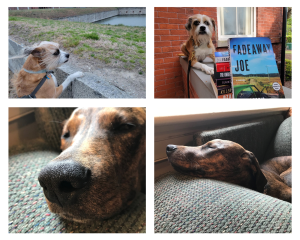
My girlfriend, Shana, and I have dogs. Gus is our grumpy old man, a border terrier who tends to be social on his own time.
Our newcomer is Daisey May. She is a Plott Hound, which I never knew existed until we adopted her from rescue shelter.
I can’t think of a better dog for me, since I tend to be plot-challenged. So far, Daisey hasn’t offered any suggestions, but I’m holding out hope.
Hugh Lessig, author of Fadeaway Joe
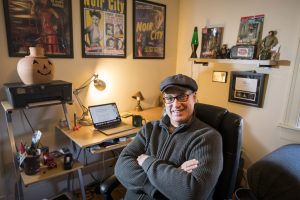
Hugh Lessig spent more than thirty years as an award-winning newspaper reporter, covering everything from city council meetings to the earthquake in Haiti.
Along the way, he’s met people at the highs and lows of life and interviewed accused murderers and governors, welders and lawyers, and old men who fought our nation’s wars.
Born in eastern Pennsylvania, he moved to Hampton Roads, Virginia, in 1997.
His short stories have appeared in Thuglit, Shotgun Honey, Crime Factory and Needle. In addition, his work is featured in the following anthologies: Mickey Finn 21st Century Noir, Volumes I and II; Groovy Gumshoes: Private Eyes in the Psychedelic Sixties; and Guns & Tacos. Fadeaway Joe is his first novel.
To find out more about Hugh, check out his website, Facebook, or Instagram.
Elena Taylor/Elena Hartwell
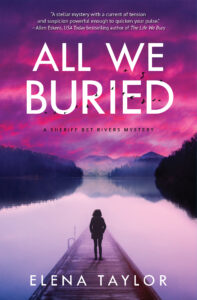
All We Buried, available now in print, e-book, and audio.
Silver Falchion Award Finalist, Best Investigator
Foreword INDIE Award Finalist, Best Mystery

